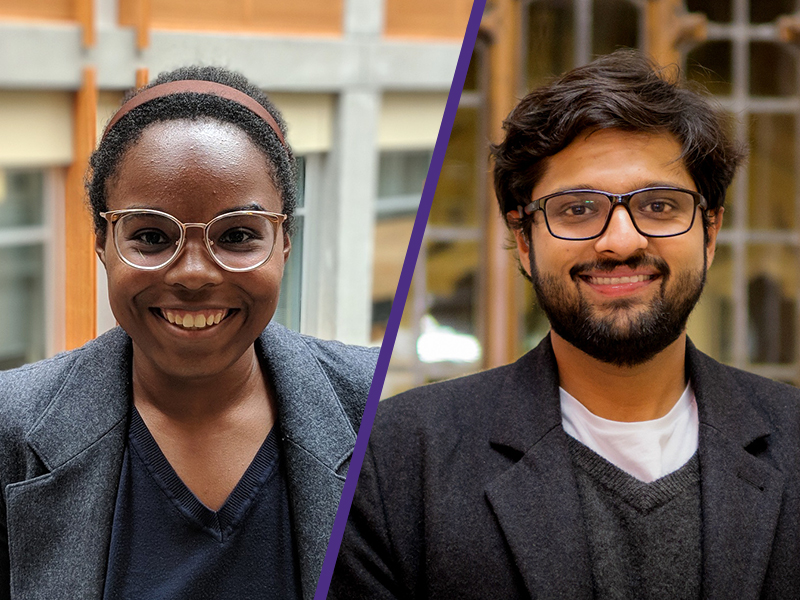
Allen School Ph.D. students Saadia Gabriel and Dhruv (DJ) Jain each won a dissertation Fellowship from Google Research and the CMD-IT Diversifying LEAdership in the Professoriate (LEAP) Alliance. In an effort to make computer science research careers more accessible, Google Research partnered with the LEAP Alliance, which is operated by the national Center for Minorities and People with Disabilities in Information Technology to increase the diversity of Ph.D. graduates in computing. Together, the organizations provided a total of six dissertation awards this year to support doctoral students from historically underrepresented groups as they complete their Ph.D. requirements.
Gabriel, advised by Allen School professor Yejin Choi, researches natural language generation and social commonsense reasoning. Gabriel has previously worked on evaluating factuality in generation, as well as improving fairness and explainability in toxic language detection. In her most recent work, she investigates how people might react to Covid-19 and climate misinformation online. She aims to find how well machine learning models interpret and understand reactions and emotions of people in everyday situations and whether or not these models are capable of recognizing text that is factually consistent with prior context. She also seeks to determine if machine learning algorithms are designed with accessibility and interpretability in mind.
Gabriel will design algorithms for machine learning approaches to find implications captured by written language then develop frameworks that can understand headlines that are harmless versus headlines that have malicious intentions. Ultimately she plans to develop a system prototype and mobile application for artificial intelligence-augmented news reading, using resources she develops for generative neural models to be trained with misinformation detection formalisms.
Gabriel has previously earned the David Notkin Endowed Graduate Fellowship in Computer Science & Engineering and the ARCS Foundation Fellowship.
Jain, who is co-advised by Allen School professor Jon Froehlich and Human Centered Design & Engineering professor and Allen School adjunct professor Leah Findlater, works in the Makeability Lab to advance sound accessibility by designing, building and deploying systems that leverage human computer interaction (HCI) and artificial intelligence (AI). His primary aim is to help people who are d/Deaf and hard of hearing (DHH) to receive important and customized sound feedback.
Jain created HomeSound, a smart home system that senses and alerts users to sound activity like a beeping microwave, blaring smoke alarm or barking dog. To increase the portability of HomeSound, Jain created SoundWatch, an app that provides always-available sound feedback on smartwatches. When the app picks up a nearby sound like a car honking, a bird chirping or someone hammering, it sends the user a notification along with information about the sound. The next phase of his research will be devoted to building on this work, which was well-received by users, to enable feedback to be customized to individual needs, such as the calls of each of their children or the beep of a new home appliance. For example, Jain is currently working on ProtoSound, a sound recognition system that can be personalized by end-users by inputting a few labelled examples of each sound.
Jain has earned two Best Paper Awards, four Best Paper Award Honorable Mentions and one Best Artifact Award at top conferences in the field of HCI. In addition to the Google Research/CMD-IT LEAP Alliance grant, he previously received a Microsoft Research Dissertation Grant to support his work.
Congratulations Saadia and DJ!

